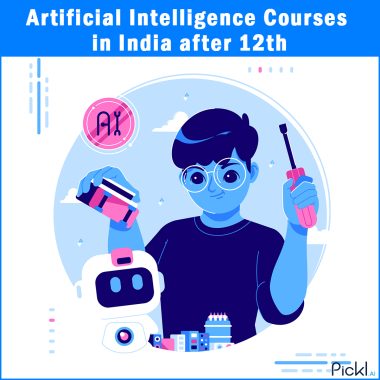Summary: Embark on your journey to learn AI from scratch with a structured roadmap. Start by mastering foundational concepts in mathematics and programming. Select the right learning path tailored to your goals and preferences. With dedication and perseverance, anyone can master AI and unlock its boundless potential.
Introduction
AI is rapidly evolving and has remained in the headlines for several years. From enhancing healthcare diagnostics to revolutionising transportation, AI’s influence permeates every facet of modern life. The urgency to grasp AI’s intricacies is undeniable.
Learning AI from scratch is more than staying relevant and shaping the future. As industries pivot towards AI-driven solutions, the need for individuals equipped with AI expertise intensifies. This blog delves into the essence of learning AI from scratch, unravelling its significance in today’s dynamic landscape of innovation and opportunity.
Keep reading, as I will also tell you how to learn AI and the roadmap. Ultimately, you will also learn how to become an AI expert and how professional certification courses can help you gain AI skills.
Definition of Artificial Intelligence (AI)
Artificial Intelligence refers to developing computer systems capable of performing tasks that typically require human intelligence. These tasks include learning, reasoning, problem-solving, perception, and language understanding.
Fundamental Concepts of AI
- Machine Learning: This branch of AI enables machines to learn from data and improve their performance over time without being explicitly programmed.
- Neural Networks: Inspired by the human brain’s structure, neural networks are algorithms that allow machines to recognise patterns and make decisions based on input data.
- Natural Language Processing (NLP): NLP enables computers to understand, interpret, and generate human language, facilitating communication between humans and machines.
- Robotics: AI-driven robotics involves designing robots capable of autonomously performing tasks in the physical world, ranging from simple assembly line operations to complex surgeries.
How AI Simulates Human Intelligence
- AI achieves human-like intelligence through algorithms and models that mimic cognitive processes such as learning, reasoning, and problem-solving.
- By processing vast amounts of data and identifying patterns, AI systems can make predictions, draw insights, and adapt their behaviour in response to changing environments.
- Through techniques like Deep Learning and reinforcement learning, AI systems simulate the ability to learn from experience and improve their performance over time, similar to how humans learn from trial and error.
Why Learn AI?
Learning AI is an investment in your future. It equips you with valuable skills, fosters innovative thinking, and empowers you to navigate a rapidly changing technological landscape. Whether you seek career advancement, intellectual stimulation, or a deeper understanding of the world around you, AI offers a rewarding path for lifelong learning.
Future-proof Your Career
The demand for skilled AI professionals is skyrocketing. According to NDTV, India’s AI market is expected to grow at an annualised rate of 25-35% between 2024 and 2027. Forbes projects the global AI market size to expand at a CAGR of 37.3% from 2023 to 2030, indicating substantial growth and opportunities in the AI industry.
By learning AI, you will equip yourself with valuable skills that will be relevant for years to come, opening doors to exciting job opportunities.
Boost Problem-solving Skills
You’ll learn how to analyse large datasets, identify patterns, and develop creative solutions using Machine Learning algorithms. These problem-solving skills are highly transferable and can benefit you in various aspects of your career.
Unlock the Power of Data
In today’s data-driven world, the ability to extract meaning from data is crucial. Learning AI equips you with the tools and techniques to analyse vast amounts of data, uncovering hidden insights that can inform better decision-making across various fields.
Fuel Innovation and Creativity
AI is not just about replacing human jobs; it’s about augmenting our capabilities. By understanding AI, you can leverage its power to automate tasks, freeing yourself to focus on more creative and strategic endeavours. AI can also help generate new ideas and accelerate innovation across different sectors.
Shape the Future of Technology
AI is a rapidly evolving field with the potential to revolutionize how we live, work, and interact with the world. By learning AI, you gain the knowledge to contribute to the responsible development and deployment of this powerful technology, shaping its impact on the future.
How to Learn AI?
Learning AI takes dedication and perseverance, but with the right resources, approach, and a passion for exploring the potential of intelligent systems, you can unlock exciting possibilities in this ever-expanding field.
Math and Statistics
A solid foundation in mathematics, particularly linear algebra, calculus, and probability & statistics, is essential. These concepts underpin many AI algorithms. Online courses or textbooks can help you brush up on these fundamentals.
Statistical methods are vital in AI, particularly in data analysis and Machine Learning. Gain proficiency in probability theory, hypothesis testing, regression analysis, and statistical inference.
Programming
Python is the dominant language in AI. Learn the basics of Python, including data structures, functions, and libraries like NumPy and Pandas, which are widely used for data manipulation and analysis in AI. Numerous online tutorials and courses cater to beginners in Python.
Machine Learning Fundamentals
Dive into Machine Learning, a subset of AI focused on developing algorithms that enable computers to learn from data. Learn about supervised, unsupervised, reinforcement, and Deep Learning techniques.
Understand supervised learning (learning from labelled data), unsupervised learning (finding patterns in unlabelled data), and reinforcement learning (learning through trial and error). Online courses and books like “Hands-On Machine Learning with Scikit-Learn, Keras & TensorFlow” by Aurélien Géron can provide a solid introduction.
Deep Learning
Deep Learning, a subfield of Machine Learning inspired by the structure and function of the brain, is a powerful technique for complex tasks like image and speech recognition.
If interested, explore frameworks like TensorFlow or PyTorch to build and train Deep Learning models. Resources like “Deep Learning with Python” by Francois Chollet offer a good starting point.
Hands-on Projects
Learning by doing is crucial in AI. Work on personal projects that allow you to apply your newfound knowledge. Kaggle, a platform for data science competitions, offers a treasure trove of datasets and challenges to test your skills.
Open-Source Contributions
Consider contributing to open-source AI projects on platforms like GitHub. This allows you to learn from experienced developers, gain practical experience, and build your portfolio.
Online Resources
The field of AI is constantly evolving. Stay updated by following industry blogs, attending webinars or conferences, and listening to podcasts by AI experts.
Join the AI Community
Connect with other AI enthusiasts online and offline. Participate in forums, discussions, and communities to share knowledge, learn from others, and stay motivated.
Programming
Proficiency in programming languages like Python, R, or Julia is essential for implementing AI algorithms. Start with the basics of programming, then progress to more advanced topics such as data structures, algorithms, and object-oriented programming.
Neural Networks
Delve deeper into neural networks, a powerful AI model inspired by the human brain. Understand how neural networks function, including their architecture, activation functions, and training methods.
Embarking to master AI requires dedication, perseverance, and a willingness to learn. By following this roadmap and remaining committed to continuous improvement, you can navigate the complexities of AI and unlock its boundless potential.
Closing Statement
Learning AI from scratch necessitates understanding the fundamental concepts and following a well-structured roadmap. By exploring how to learn AI through foundational mathematics, programming skills, and hands-on projects, individuals can progress towards becoming AI experts.
Leveraging mentorship, community support, and a commitment to continuous learning are pivotal in mastering AI. Thus, one can navigate the field’s complexities, unlock its potential, and contribute to its ever-evolving landscape by adhering to a clear roadmap to learning AI.
Ready to launch your career into the thriving world of AI and Data Science?
Join Pickl.AI today and unlock your potential! As AI reshapes industries, the demand for Data Science skills is skyrocketing.
Pickl.AI offers top-tier online professional certification courses guided by practising data scientists and real-world projects, whether you’re a seasoned professional or just starting.
Discover our flagship programs, like the Job Guarantee and Job Preparation Program, designed to propel your career forward. Dive into our Data Science Bootcamp for comprehensive training. Free ChatGPT and Machine Learning courses cater to everyone.
Don’t miss this opportunity to master relevant data science tools and skills. Start your journey with Pickl.AI today and carve your path to success!
Frequently Asked Questions
What are the Essential Prerequisites to Learning AI From Scratch?
To learn AI from scratch, it’s vital to grasp foundational concepts in mathematics such as algebra, calculus, and probability. Proficiency in programming languages like Python is crucial for implementation. These skills lay the groundwork for understanding and effectively applying AI algorithms.
How Can I Select the Right Roadmap to Learn AI?
Selecting the proper AI roadmap involves considering your goals, learning style, and available resources. Evaluate courses and resources that align with your objectives, focusing on Machine Learning, Deep Learning, and natural language processing to build a solid foundation.
Where Can I Find Mentorship and Community Support for Learning AI?
For mentorship and community support in learning AI, seek guidance from experienced professionals and join online forums and communities dedicated to AI enthusiasts. Engaging with mentors and fellow learners provides valuable insights, feedback, and encouragement throughout your journey to becoming an AI expert.





